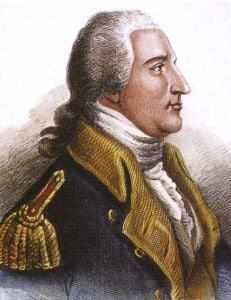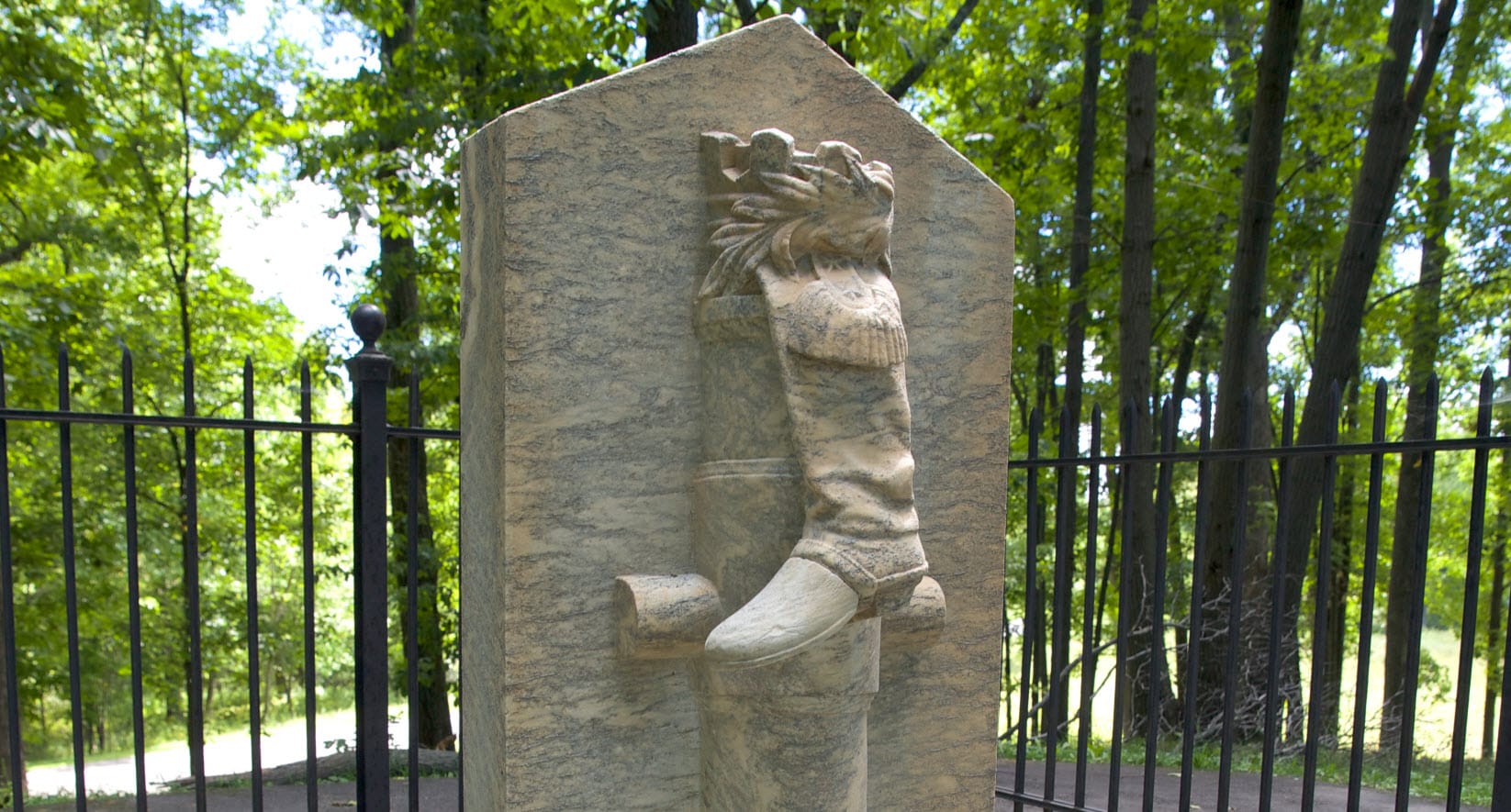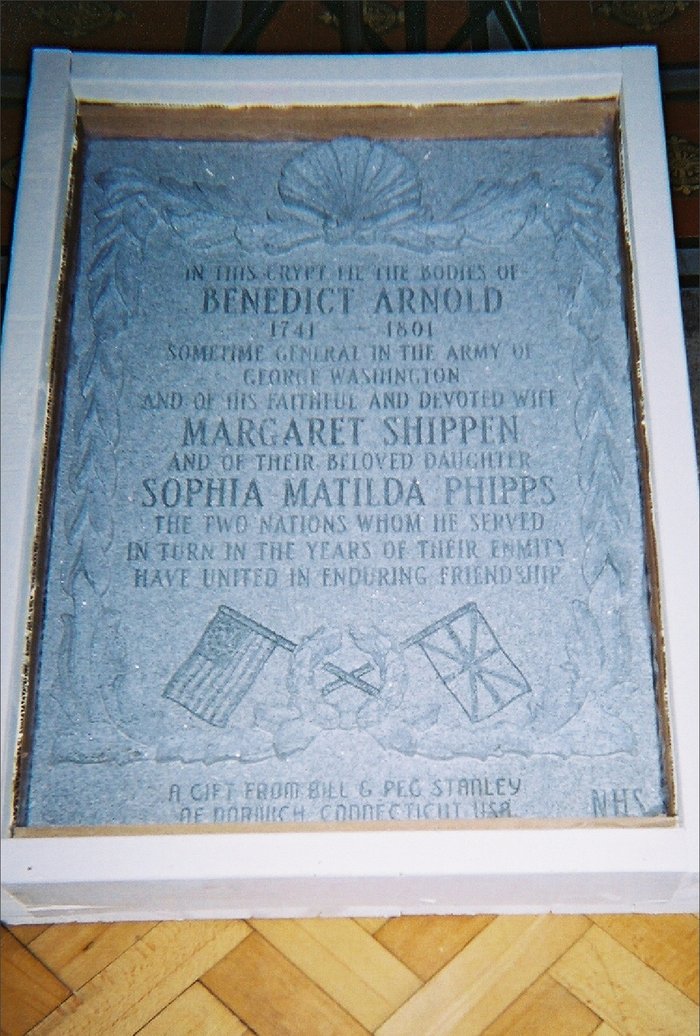Benedict Arnold is a name that is synonymous with traitor in the United States of America. However, many don't realize that Benedict Arnold was one of the greatest generals of the American Revolutionary War. The reason his betrayal was so devastating to the Americans is that he had served the American cause so passionately during the Invasion of Canada and the Battle of Saratoga.

His passion would soon turn against the Americans as his ambition took control. He was continually passed over for promotion, and it began to weigh on him. Horatio Gates, Benjamin Lincoln, and others were given promotions by the Continental Congress, and each one showed their inability to lead.
This caused him to believe that he would never be given the command of anything significant and requested that he be given charge of West Point from George Washington. Washington obliged and would soon foil Benedict Arnold's attempt to betray his country.
Early Years
- Arnold was one of six children to his father, Benedict Arnold III, and his mother, Hannah King. He was born in the Connecticut Colony on January 14, 1741. Arnold's childhood was rough but typical of that day. He and his sister Hannah would be the only children to survive until adulthood, and his parents would have to bury 4 of their kids.
- Benedict Arnold grew up wealthy, as his dad had much success in business. He received one of the better educations in Connecticut when he attended the private school of Canterbury.
- Unfortunately, Arnold's father became an alcoholic after the consecutive deaths of his children, and the family fortune began to fade. Unable to attend college, Arnold's mother, Hannah, secured an apprenticeship for him with two of her cousins who operated a vibrant trade in Norwich, Connecticut. He would be an apprentice for seven years and then enlist in the Connecticut militia in 1757. His mother would die in 1759, and his father would follow two years later in 1761. As a young man, Arnold was left alone, and it would be up to him to build a new family legacy.
- Arnold would not only restore the family legacy but surpass it. In 1762, he established a business as a pharmacist and bookseller. Over time, he was able to expand that business and continue his success. He then bought the old Arnold property that his father had lost due to debt and resold it a year later for a substantial profit that would aid him in purchasing 3 trading ships, which would begin a highly profitable spice trade with the West Indies. He then sent for his sister and allowed her to manage his business while he traveled. Through this time, Arnold became well-educated in the terrain of New England and Canada, which would aid him later on.
- Success for Arnold met an immediate halt when the Sugar Act and Stamp Act were imposed on the colonies by the British Empire. He quickly joined the Sons of Liberty in response. At first, Arnold simply ignored the act and pretended as if it did not exist, but the act put much pressure on his business and caused him to fall into great debt to the point creditors were coming after him. His anger came to a head when he beat up a man who was attempting to inform the authorities of Arnold's smuggling. He was given a light fine and sentence for his actions.
- Benedict Arnold married Margaret Mansfield, and the two had three sons together. Margaret died while Arnold was with Ethan Allen at the Capture of Fort Ticonderoga. His sister Hannah would raise the boys and manage the household while Arnold was away.
Early Revolutionary War
- At the outbreak of the war, Benedict Arnold enlisted in the Connecticut militia and was given the rank of Captain.
- After the Battles of Lexington and Concord bottled the British troops up in Boston, Benedict Arnold and his men marched and helped lay siege. Here, he met many of his future peers, George Washington, Nathaniel Greene, and Henry Knox.
- Arnold would quickly gain a positive reputation as an officer of the men and a man who would take the fight to the British, which is the type of man that General Washington was looking for.
- He proposed an ambitious plan to capture the Fort of Ticonderoga. He believed the fort to have valuable supplies and to be poorly defended. Along the way to Fort Ticonderoga, he met up with Ethan Allen and the Green Mountain Boys.
- He and Ethan Allen did not see eye-to-eye, and when the fort was captured, Allen took all the glory from it. Arnold then quickly raided Fort Saint-Jean.
- He resigned his Massachusetts commission after he and Ethan Allen could not settle their differences. On the way home, he learned that his beloved wife had died.
- After mourning the loss of his wife for a short period, Arnold began urging the Continental Congress to authorize and give him command of an invasion of Quebec.
- Congress passed over for him, so Arnold then petitioned General Washington to send a second expedition to attack Quebec City through a wilderness route. He gave Arnold a colonel's commission and men for the invasion.
- En route, 300 of his men would abandon him, and 200 would die of cold, disease, and starvation. Benedict arrived in Canada in November and was joined by Richard Montgomery. The Continental Army, tired from travel and disease, fought bravely and nearly defeated the British.
- Richard Montgomery died in the battle, and Arnold's leg was shattered.
- He was promoted to brigadier general for his role in Quebec.
- Benedict Arnold then took part in a series of battles shortly after he traveled to Montreal. He was a military commander of Montreal until the British Army forced the Americans to remove him. He guarded the rear of a retreat from Saint-Jean, directed the construction of a fleet to defend Lake Champlain, and was defeated in one of the first naval battles of the American Revolutionary War at the Battle of Valcour Island. These actions, although trivial, delayed the British enough that they could not re-capture Fort Ticonderoga until 1777.
- While Arnold was noble on the battlefield, he was rough and argumentative to many of his superiors. He made many enemies during this time and some influential friends. He became good friends with Daniel Morgan, Horatio Gates, Philip Schuyler, and even George Washington, who always believed Arnold to be a fighting general.
- He rubbed many in Congress the wrong way, and in the world of politics, it cost him. He was consistently looked over for promotion by many that were inferior to him. He had a quarrel with Moses Hazen, which resulted in a court-martial. One of his enemies, John Brown, said this about Arnold, "Money is this man's God, and to get enough of it he would sacrifice his country."
Saratoga To Philadelphia
- General Washington assigned Arnold to the defense of Rhode Island following the British seizure of Newport in December 1776, where the militia was too poorly equipped to consider a military action against the Redcoats.
- In February 1777, he found out that he had been passed over for promotion to major general by the Continental Congress. Washington refused his offer to resign and wrote to members of Congress in an attempt to correct this, noting that "two or three other very good officers" might be lost if they persisted in making politically motivated promotions.
- Arnold was on his way to Philadelphia to discuss his future when he was alerted that a British force was marching toward a supply depot in Danbury, Connecticut. Along with David Wooster and Connecticut militia General Gold S. Silliman, he organized the militia response.
- In the Battle of Ridgefield, he led a small contingent of militia attempting to stop or slow the British return to the coast and was again wounded in his left leg.
- Arnold continued on to Philadelphia, where he met with members of Congress about his rank. His action at Ridgefield, coupled with the death of Wooster due to wounds sustained in action, resulted in Arnold's promotion to major general, although his seniority was not restored over those who had been promoted before him.
- Arnold wrote out a letter of resignation on July 11, the same day word arrived in Philadelphia that Fort Ticonderoga had fallen to the British. Washington once again refused his resignation and ordered him north to assist with the defense there.
- Arnold arrived in Schuyler's camp at Fort Edward, New York, on July 24. On August 13, Schuyler dispatched him with a force of 900 to relieve the siege of Fort Stanwix, where he succeeded in the use of a ruse to lift the siege.
- Arnold had an Indian messenger sent into the camp of British Brigadier General Barry St. Leger with news that the approaching force was much larger and closer than it actually was; this convinced St. Leger's Indian support to abandon him, forcing him to give up the effort.
- Arnold then returned to the Hudson, where General Gates had taken over command of the American army, which had by then retreated to a camp south of Stillwater.
- He then distinguished himself in both Battles of Saratoga. Burgoyne surrendered ten days after the second battle, on October 17, 1777. In response to Arnold's valor at Saratoga, Congress restored his command seniority.
- Arnold spent several months recovering from his injuries.
- He refused to have his wounded leg amputated and had it set. The result was a 2-inch difference between both legs, which left a significant limp.
- On his return to Valley Forge, the men who served him during Saratoga applauded him.
- He participated in the first recorded Oath of Allegiance along with many other soldiers, as a sign of loyalty to the United States.
- After the British withdrew from Philadelphia in June 1778, Washington appointed Arnold military commander of the city.
- Arnold lived extravagantly in Philadelphia and was a prominent figure on the social scene.
- During the summer of 1778, Arnold met Peggy Shippen, the 18-year-old daughter of Judge Edward Shippen, a Loyalist sympathizer who had done business with the British while they occupied the city.
- Peggy had been courted by British Major John André during the British occupation of Philadelphia.
- Arnold married the young Shippen girl on April 8, 1779.

Treason
- Arnold showed signs of dissatisfaction throughout his tenure as an American officer, but there was a noticeable shift when he was appointed commander of Philadelphia.
- Nathanael Greene had heard rumors of Arnold's dissatisfaction with the American situation. Arnold had begun worrying about the internal fighting among Congress, Congress's terrible promotions, and the inflation of the Continental dollar.
- Sometime early in May 1779, Arnold began corresponding with John Andre. Andre was the spy chief of the British and a friend of William Franklin, the son of Benjamin Franklin.
- Andre and Arnold began to communicate in secret. Letters were passed through Peggy's circle of women.
- Arnold communicated with General Henry Clinton and began giving locations of supply depots along with troop locations and strengths. During this time, Clinton expressed an interest in West Point.
- Arnold faced much scrutiny over his actions in Philadelphia including a formal rebuke from George Washington. Arnold resigned from his position.
- Through much deliberation, Arnold was given command over West Point.
- He quickly began to systematically weaken its defenses
- Arnold met with Andre on September 21 and wrote out passes so he could get through West Point's defenses. On his way back, Andre was captured by Benjamin Tallmadge. Tallmadge was Washington's spy chief.
- Soon, the dominos fell, and Arnold's treason was revealed. Washington learned of his betrayal and offered a prisoner exchange to Clinton. The exchange was the popular John Andre for Benedict Arnold. Clinton refused, and Andre was hanged.
- Arnold tried to plead his case in an open letter but to no avail.
- Due to Arnold's failure, he did not receive the compensation that was agreed upon. He was given a brigadier general's commission but was never trusted among his superior officers.
Later Years

- Arnold set out to rebuild his business reputation, participated in land speculation in New Brunswick, and set up a home in England. He also outfitted a privateer ship that participated in the French Revolution.
- In January 1801, Arnold's health began to decline. Gout, from which he had suffered since 1775, attacked his unwounded leg to the point where he was unable to go to sea; the other ached constantly, and he walked only with a cane. His physicians diagnosed him as having dropsy, and a visit to the countryside only temporarily improved his condition.
- He died after four days of delirium on June 14, 1801, at the age of 60. Legend has it that when he was on his deathbed, he said, "Let me die in this old uniform in which I fought my battles. May God forgive me for ever having put on another," but this may be apocryphal. Arnold was buried at St. Mary's Church, Battersea, in London, England. As a result of a clerical error in the parish records, his remains were removed to an unmarked mass grave during church renovations a century later. His funeral procession boasted "seven mourning coaches and four state carriages"; the funeral was without military honors.
- He left a small estate, reduced in size by his debts, which Peggy undertook to clear. Among his bequests were considerable gifts to one John Sage, perhaps an illegitimate son.
